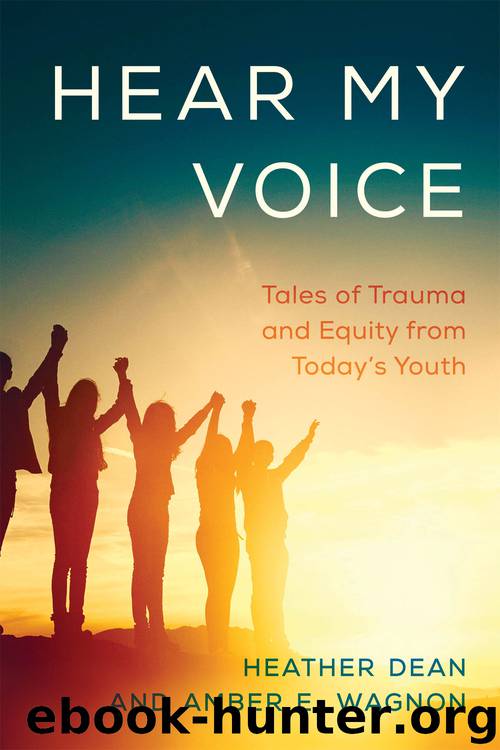Hear My Voice by Heather Dean

Author:Heather Dean
Language: eng
Format: epub
ISBN: 9781475853360
Publisher: Rowman & Littlefield Publishers
Published: 2019-09-10T16:00:00+00:00
BRAIN RESEARCH AND LEARNING
In the case of Craig, what could have possibly driven those students to bully him in such damaging ways? Bullies are not always the student who gets in trouble or refuses to do homework. Bullies, like Derrick, may often be popular with other students and teachers, be a good student, and have caring parents. However, most bullies have trouble managing their emotions, are aggressive and confrontational, have little concern or empathy for others, are quick to anger, and know how to use manipulation to get their own way.
Bullies can control others through verbal threats and physical actions, can be antisocial, and are more likely to break school rules than others. Many times, students use bullying because they haven’t developed other coping skills to face challenges in life. They are just as at risk of having emotional problems as the children they victimize. Students who are always bullying others can have many problems that follow them into adulthood, such as aggression, alcohol and drug abuse, quick tempers, violent actions, depression, and difficulties with relationships (Carpenter & D’Atona, 2014; Harris & Petrie, 2003; Hazler, Carney, & Granger, 2006; Miller & Lowen, 2012).
Bullied students are not always like Craig, but anyone can be a target of bullying behavior. Victims of bullying may be more passive, anxious, insecure, quiet, or afraid of confrontation. They may also be physically smaller and weaker than other students and have a harder time interacting with their peers. The bullied student may feel socially isolated and have a poor self-concept. Students who are bullied may have difficulty sleeping and experience nightmares, as well as a reduced appetite and trouble learning in school. They may also want to miss school, try to hurt themselves, and even have suicidal thoughts or actions.
Bullying can inhibit academic performance, lower self-esteem, hinder social relationships, encourage dropping out, and cause constant emotional stress. Being a target can lead to hopelessness and have long-term effects. The emotional damage of bullying will last even longer than the physical harm done to the victim. Families of victims have been so desperate to keep their children safe from bullies that they change schools, move to another home, and even move out of town to protect their children (Carpenter & D’Atona, 2014; Harris & Petrie, 2003; Hazler, Carney, & Granger, 2006; Miller & Lowen, 2012).
What about the third party in the bullying triangle—the bystanders? Sometimes bullies like to have an audience because the presence of bystanders can increase the negative impact of the bullying for the victim and can give the bully more power and recognition. Bystanders can be anyone—kids, parents, teachers, adults, bus drivers, lunch aides, principals, and so on. In fact, there are many more bystanders than bullies and victims combined.
But why are the bystanders being passive and doing nothing about the bullying? Many bystanders believe that bullying is funny as evidenced in the various YouTube videos of kids bullying kids. Those who are passively watching the bullying may not know what to do or think that telling someone would not accomplish anything.
Download
This site does not store any files on its server. We only index and link to content provided by other sites. Please contact the content providers to delete copyright contents if any and email us, we'll remove relevant links or contents immediately.
| Administration | Assessment |
| Educational Psychology | Experimental Methods |
| History | Language Experience Approach |
| Philosophy & Social Aspects | Reform & Policy |
| Research |
The Art of Coaching Workbook by Elena Aguilar(51137)
Trainspotting by Irvine Welsh(21608)
Twilight of the Idols With the Antichrist and Ecce Homo by Friedrich Nietzsche(18602)
Fangirl by Rainbow Rowell(9213)
Periodization Training for Sports by Tudor Bompa(8237)
Change Your Questions, Change Your Life by Marilee Adams(7718)
This Is How You Lose Her by Junot Diaz(6857)
Asking the Right Questions: A Guide to Critical Thinking by M. Neil Browne & Stuart M. Keeley(5741)
Grit by Angela Duckworth(5577)
Red Sparrow by Jason Matthews(5450)
Paper Towns by Green John(5163)
Room 212 by Kate Stewart(5091)
Ken Follett - World without end by Ken Follett(4705)
Housekeeping by Marilynne Robinson(4420)
The Sports Rules Book by Human Kinetics(4367)
Double Down (Diary of a Wimpy Kid Book 11) by Jeff Kinney(4252)
Papillon (English) by Henri Charrière(4238)
The Motorcycle Diaries by Ernesto Che Guevara(4069)
Exercise Technique Manual for Resistance Training by National Strength & Conditioning Association(4048)
